Dodge Caravan
| Dodge Caravan | |
|---|---|
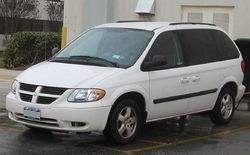 | |
| Overview | |
| Manufacturer | Dodge |
| Production | 1984-present |
| Assembly | Fenton, Missouri Windsor, Ontario, Canada |
| Body and chassis | |
| Class | Minivan |
| Chronology | |
| Successor | Dodge Journey (for regular Caravan) |
The Dodge Caravan and Dodge Grand Caravan are minivans manufactured by Chrysler. It was introduced in November 1983 for the 1984 model year along with sister models, the Chrysler Town and Country, and the Plymouth Voyager (later Chrysler Voyager). The first modern minivans, the Chrysler company minivans are credited with creating the entire market segment for these vehicles. The Chrysler twins were launched a few months ahead of the Renault Espace (the first MPV/minivan in Europe, first pitched to executives as a Talbot in 1979 [1], but not launched until 1984), making them the first of their kind.
Since their introduction, the Chrysler minivans have been the best-selling minivans in the United States.
Overview
| First generation | |
|---|---|
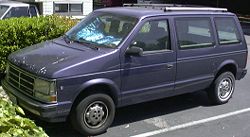 | |
| Overview | |
| Production | 1984-1990 |
| Body and chassis | |
| Body style | 3-door minivan |
| Layout | FF layout |
| Platform | Chrysler S platform |
| Related | Chrysler Town & Country Plymouth Voyager |
| Powertrain | |
| Engine | 2.2 L K I4 2.5 L K I4 2.5 L Turbo I4 2.6 L Mitsubishi G54B I4 3.0 L Mitsubishi 6G72 V6 3.3 L EGA V6 |
| Transmission | 4-speed A460 manual 5-speed manual 3-speed A413 automatic 3-speed A470 automatic 3-speed A670 automatic 4-speed A604 automatic |
| Dimensions | |
| Wheelbase | 1984-1988 SWB: Template:Auto in Grand Caravan & C/V Extended: Template:Auto in 1989-1990 SWB & C/V: Template:Auto in |
| Length | SWB & C/V: Template:Auto in Grand Caravan: Template:Auto in 1989-1990 LE SWB: Template:Auto in 1989-1990 Grand Caravan LE: Template:Auto in C/V Extended: Template:Auto in |
| Width | 1984-1988: Template:Auto in 1989-1990: Template:Auto in |
| Height | 1984-1988 SWB: Template:Auto in 1987-1988 Grand Caravan: Template:Auto in C/V: Template:Auto in 1989-1990 SWB: Template:Auto in 1989-1990 Grand Caravan: Template:Auto in |
Introduced in November 1983 for the 1984 model year, the Dodge Caravan was based on the Chrysler S platform, an extended derivative of the Chrysler K platform. For the 1987 model year, a longer wheelbase was introduced, which was called the Grand Caravan. It was still based on the Chrysler S platform.
The idea of a minivan was the brainchild of both Lee Iacocca and Hal Sperlich during their days at the Ford Motor Company. Henry Ford II denied Iacocca's and Sperlich's idea (and a prototype) of a minivan back in 1974, rumored to be called a "Maxivan". When Iacocca was in the midsts of turning around the then-ailing Chrysler Corporation, he and Sperlich (who had been scouted to Chrysler by Iacocca) and many others no doubt, created the T115 minivan. The T115 ultimately was christened Caravan and Voyager. A first year production Dodge Caravan is displayed at the Henry Ford Museum in Detroit.
Since the beginning of production in the fall of 1983, over 11 million Chrysler, Dodge and Plymouth minivans have been sold as of mid-2005.
Special anniversary editions of the Chrysler minivans have been issued to mark significant milestones; the first, in 1994, is notable for the "10 YEAR ANNIVERSARY EDITION" badges and special two-tone paint, and was offered on the Dodge SE models. The twentieth anniversary was marked in 2004 with the Anniversary Edition SXT Caravan.
Also, in 2004, Chrysler held a Stand By Your Van Contest, where contestants had to place one hand on the new van. The person whose hand was on the longest won a brand new Caravan, and be one of the first consumers to experience the new Stow 'n Go seating. The event was held during the Chicago Auto Show.
Magician Doug Henning was used as a spokesman to introduce the Caravan as a vehicle with the space of a cargo van that would fit in a standard garage and a low step-in height for small children.
First Generation (1984-1990)
The first generation Caravans used the Chrysler S platform, which was closely related to the K-cars Dodge Aries and Plymouth Reliant. There were three trim levels on the first generation Caravan: base, mainstream SE and upscale LE. The Caravan was on Car and Driver magazine's Ten Best list for 1985. Both a three-speed TorqueFlite automatic transmission and a five-speed manual were available with the inline-4, including the turbocharged 2.5 L (this was a rare combination). A cargo version of the Caravan, called the Mini Ram Van, was also introduced in 1984. It was renamed as the Caravan C/V for 1989, and was discontinued after 1995. 1989-1990 turbocharged models are highly sought after by collectors.
-
1984-1986 Dodge Caravan (Camper)
-
1987-1990 Dodge Grand Caravan
Engines
- 1984-1987 2.2 L K I4, 99 hp (74 kW)
- 1987½-1990 2.5 L K I4, 100 hp (75 kW)
- 1989-1990 2.5 L Turbo I4,150 hp (106 kW)
- 1984-1987 2.6 L Mitsubishi G54B I4
- 1987½-1989 3.0 L Mitsubishi 6G72 V6, 136 hp (101 kW)
- 1990 3.0 L Mitsubishi 6G72 V6, 142 hp (106 kW)
- 1990 3.3 L EGA V6, 150 hp (112 kW)
Trims
- 1984-1990 - base
- 1984-1990 - SE
- 1984-1990 - LE
- 1989-1990 - Turbo
Senond Generation (1991-1995)
| Second generation | |
|---|---|
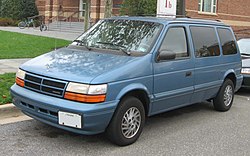 | |
| Overview | |
| Production | 1991-1995 |
| Body and chassis | |
| Body style | 3-door minivan |
| Layout | Front engine, front-wheel drive/four-wheel drive |
| Platform | Chrysler AS platform |
| Related | Chrysler Town & Country Plymouth Voyager |
| Powertrain | |
| Engine | 2.5 L K I4 3.0 L Mitsubishi 6G72 V6 3.3 L EGA V6 3.8 L EGH V6 |
| Transmission | 5-speed manual 3-speed A413 automatic 3-speed A670 automatic 4-speed A604 automatic |
| Dimensions | |
| Wheelbase | 1991-1993 C/V: Template:Auto in SWB & 1994-1995 C/V: Template:Auto in 1991-1993 C/V Extended: Template:Auto in C/V AWD: Template:Auto in Grand Caravan & 1994-1995 C/V Extended: Template:Auto in |
| Length | 1991-1993 C/V: Template:Auto in 1991-1993 SWB & 1994-95 C/V: Template:Auto in 1991-1993 C/V Extended: Template:Auto in Grand Caravan: Template:Auto in |
| Width | Template:Auto in 1991 C/V: Template:Auto in 1992-1993 C/V: Template:Auto in |
| Height | SWB & 1991-93 C/V: Template:Auto in Grand Caravan: Template:Auto in 1991-93 AWD: Template:Auto in Grand Caravan: Template:Auto in Grand Caravan: Template:Auto in 1994-95 SE: Template:Auto in |
Through 1991 through 1995, the Caravan used the Chrysler AS platform. These were the last minivans that were derived from the Chrysler K platform.
This generation of vans brought additional innovations, such as:
- "Quad Command" bucket seating (1991)
- Integrated child safety seats (1992), improved design with recliners (1994)
- Available anti-lock brakes (1991)
- First driver's side airbag in a minivan (1991), made standard (1992), and first dual front airbags (1994)
- First minivan to meet 1998 U.S. federal safety standards (1994)
Engines
- 1991–1995 2.5 L K I4, Template:Auto hp and Template:Auto ft.lbf
- 1991–1995 3.0 L Mitsubishi 6G72 V6, Template:Auto hp and Template:Auto ft.lbf
- 1991–1995 3.3 L EGA V6, Template:Auto hp and Template:Auto ft.lbf.
- 1994–1995 3.8 L EGH V6, Template:Auto hp and Template:Auto ft.lbf.
Trims
- 1991-1995 - base
- 1991-1995 - SE
- 1991-1995 - LE
- 1993-1995 - Sport Wagon
- 1991-1995 - ES
Note: All wheel drive was only available on loaded SE or higher models.
Differences between the Dodge Caravan and the Plymouth Voyager
The main ways that the Caravan can be distinguished from the Plymouth Voyager, other than badging, are the headlights and taillights. The headlights on the Voyager have chrome strips on the top and bottom - on the Caravan, the form factor of the lights is slightly higher, and the chrome strips are not present. On the Caravan, the taillights appear to have black stripes running horizontally, whereas on the Voyager, these are not present, but the taillights have textured grooves. Another difference between the Caravan and the Voyager is the grille. The Caravan has the standard Dodge "gun sight grille" while the Voyager has an eggcrate grille, a Plymouth staple of that era. Of course, because these parts are interchangeable, and people often use whatever parts are most readily available, these are not a sure indicator as to what the vehicle was originally manufactured as.
Third Generation (1996-2000)
| Third generation | |
|---|---|
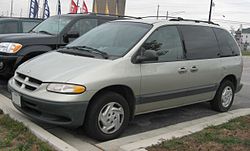 | |
| Overview | |
| Production | 1996-2000 |
| Body and chassis | |
| Body style | 3/4-door minivan |
| Layout | Front engine, front-wheel drive/four-wheel drive |
| Platform | Chrysler NS platform |
| Related | Chrysler Town & Country Plymouth Voyager Chrysler Voyager |
| Powertrain | |
| Engine | 2.4 L EDZ I4 3.0 Mitsubishi 6G72 V6 3.3 L EGA V6 3.8 L EGH V6 |
| Transmission | 3-speed 31TH automatic 3-speed A670 automatic 4-speed 41TE automatic |
| Dimensions | |
| Wheelbase | SWB: Template:Auto in Grand Caravan: Template:Auto in |
| Length | SWB: Template:Auto in Grand Caravan FWD: Template:Auto in Grand Caravan AWD: Template:Auto in |
| Width | Template:Auto in |
| Height | Template:Auto in FWD: Template:Auto in |

The 1996 redesign used the Chrysler NS platform and included a driver's side sliding door (optional at first, but standard later), a first for Chrysler. All wheel drive was reintroduced in 1997. The 1996 Caravan, along with the Plymouth Voyager and the Chrysler Town and Country, all won the North American Car of the Year award. The Caravan, however, was also Motor Trend magazine's Car of the Year for 1996. It has been on Car and Driver magazine's Ten Best list for 1996 and 1997.
Base models of the Caravan were offered in most states with either a 2.4 L four-cylinder or the 3.0 L Mitsubishi V6 engine, except in several northeastern states, where the Mitsubishi V6 didn't meet emissions standards. In those locales, the 3.3 L engine was offered as the V6 option from 1997 through 2000. The manual transmission, never popular, was dropped. The 2.4 L four-cylinder engine produced more power than the Mitsubishi 3.0 had in the first two generations.
Engines
- 1996-2000 2.4 L EDZ I4, 150 hp (112 kW) and 167 ft·lbf (226 N·m) (Canadian vans beginning in 1999 included a 3.0 V6 as standard equipment)
- 1996-2000 3.0 L Mitsubishi 6G72 V6 142 hp (106 kW) (not available in certain states)
- 1996-2000 3.3 L EGA V6, 158 hp (118 kW) and 203 ft·lbf (275 N·m)
- 1996-1998 3.8 L EGH V6, 166 hp (124 kW)
- 1999-2000 3.8 L EGH V6, 180 hp (134 kW)
Trims
- 1996-2000 - Base
- 1996-2000 - SE
- 1996-2000 - Sport
- 1996-2000 - LE
- 1996-2000 - ES
Note: All-wheel drive was only available on loaded SE or higher models
Concepts
Other plans for this model year included three minivan concepts all to be made in the Windsor Assembly, the Dodge Caravan R/T, Voyager XG, and the Chrysler Pacifica. The Caravan R/T was to include the most powerful engine ever for a minivan, rated at 325 hp (240 kW). It had two Dodge Viper hoodscoops, a brushed aluminum instrument panel, racing-style pedals, and black and white rubber flooring.[citation needed] The Voyager XG was more rugged, and included many outdoor amenities, such as a built-in ice pack.[citation needed] The Chrysler Pacifica was more luxurious, had power leather seats and footrests, overhead bins and lighting, an LHS grille, and roof-long skylights. The skylight feature was used by Nissan in the Quest. The Pacifica actually did come to be in 2004, based on the current Caravan, except that it became a crossover SUV rather than a minivan.
Fourth Generation (2001-2007)
| Fourth generation | |
|---|---|
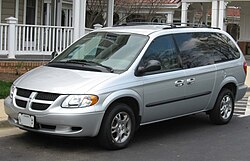 | |
| Overview | |
| Production | 2001-2007 |
| Body and chassis | |
| Body style | 4-door minivan |
| Layout | Front engine, front-wheel drive / four-wheel drive |
| Platform | Chrysler RS platform |
| Related | Chrysler Town & Country Chrysler Pacifica Chrysler Voyager |
| Powertrain | |
| Engine | 2.4 L EDZ I4 3.3 L EGA V6 3.8 L EGH V6 |
| Transmission | 3-speed 31TH automatic with 2.4EDZ 4-speed 41TE automatic |
| Dimensions | |
| Wheelbase | SWB: Template:Auto in Grand Caravan: Template:Auto in |
| Length | 2001-2004 SWB: Template:Auto in 2005-2007 SWB: Template:Auto in Grand Caravan: Template:Auto in/Template:Auto in in |
| Width | Template:Auto in |
| Height | Template:Auto in |
The fourth generation minivans use the Chrysler RS platform. Foldable Stow 'n Go second and third-row seats, available only on the Grand Caravan, were introduced for 2005. The 2001 model year vans only slightly differed from the previous generation, except for the interior, it had a larger body frame, wider headlights, flipped taillights, and a few minor mechanical adjustents.
In 2001 Chrysler introduced power sliding doors and a power hatch to their vans. These were options at first, adding the passenger sliding door, hatch, and driver sliding door, in that order. These later became standard.
The new minivan was much larger than before, with more cargo space.
The 2005 minivan lineup had changes to the Caravan, including a revised grille, new foglight fascia, new back seats, and other minor interior touches. The information center was moved from behind the gauges to the overhead console, in addition to Stow 'n Go seating. However, in order to accommodate the Stow 'n Go seating, the all-wheel drive system was dropped.
The Mitsubishi 3.0 L V6, which no longer met emissions standards in California and the northeastern U.S., was dropped from the engine lineup for 2001. A 3.5 L V6 was also planned for a mid-year introduction for 2001, but this never came to fruition.
The Caravan C/V also returned to the lineup for 2003 after being discontinued in 1995. The C/V features deleted side windows and optional rear seats among other features.
The short-wheelbase Caravan has been dropped for 2007, and will be replaced by the Dodge Journey crossover SUV for 2009.
Engines
- 2001-present 2.4 L EDZ I4, 150 hp (112 kW) at 5400 rpm and 165 ft·lbf (224 N·m) at 4000 rpm (Caravan SE only)
- 2001-present 3.3 L EGA V6, 180 hp (134 kW) at 5000 rpm and 210 ft·lbf (285 N·m) at 4000 rpm
- 2001-present 3.8 L EGH V6, 215 hp (160 kW) at 5000 rpm and 245 ft·lbf (332 N·m) at 4000 rpm
Note: In Canada, the 3.3 L V6 is standard on all models.
Trims
- 2001-present - base (also referred to as SE)
- 2001-present - Sport
- 2004-present - SXT
- 2001-2003 - ES
- 2002-2003 - EX
Fifth generation (2008-present)
| Fifth generation | |
|---|---|
 | |
| Overview | |
| Production | 2008-present |
| Body and chassis | |
| Body style | 4-door minivan |
| Layout | FF layout |
| Platform | Chrysler RT platform |
| Related | Chrysler Town and Country Volkswagen Routan |
| Powertrain | |
| Engine | 3.3 L 175 hp (130 kW) V6 3.8 L 197 hp (147 kW) V6 4.0 L 251 hp (187 kW) V6 |
| Transmission | 4-speed automatic(3.3 engine) 6-speed automatic (3.8, 4.0 engines) |
| Dimensions | |
| Wheelbase | Template:Auto in |
| Length | Template:Auto in |
| Width | Template:Auto in |
| Height | Template:Auto in |
In 2007, Ralph Gilles redesigned the Grand Caravan for the 2008 model year. Gilles previously worked on the Chrysler 300 and Dodge Magnum. A six-speed automatic transmission is standard with the 3.8 L V6 and the new 4.0 L V6. The four-speed automatic transmission is standard with the 3.3 L Flex-Fuel V6. There are thirty five new or improved features on the 2008 Grand Caravan. Some of the more notable available features include "Swivel-N-Go" seating with a stowable table, the MyGIG entertainment system, second and third row video screens, powered second row windows, and standard side curtain airbags.
Chrysler has finalized a deal through which Volkswagen will receive a variant of the Chrysler RT platform van called the Routan with its own styling and features. It is expected to be produced at Windsor Assembly alongside the Grand Caravan. Volkswagen says it is not the same as the Chrysler minivans, but still uses the same platform. The short-wheelbase Caravan is discontinued, as the Dodge Journey is to replace it.
The 2008 Dodge Grand Caravan debuted at the 2007 North American International Auto Show.
Minivan production
The long-wheelbase Dodge Grand Caravan with Stow 'n Go seats are built in Windsor, Ontario, Canada at Windsor Assembly (WAP Plant 3) by members of Canadian Auto Workers Local 444. The short wheelbase Dodge Caravan was produced in Fenton, Missouri at Saint Louis Assembly by members of the United Auto Workers Local 110.
External links
References
- "Generations: Chrysler, Dodge and Plymouth Minivans". Edmunds.com. Retrieved January 3.
{{cite web}}: Check date values in:|accessdate=(help); Unknown parameter|accessyear=ignored (|access-date=suggested) (help)


